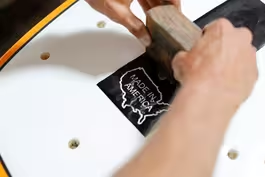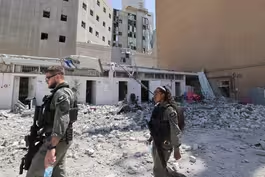
Dissecting the strength of Iran's regime as war rages on
Clip: 6/19/2025 | 7m 9sVideo has Closed Captions
Dissecting the strength of Iran's regime and Trump's wait-and-see approach to the war
Iran and Israel show no signs of backing down as the conflict continues and more and more civilians get caught in the crossfire. Abbas Milani, director of the Iranian Studies program at Stanford University, joins Amna Nawaz to take a closer look at the state of play in the Israel-Iran war.
Problems playing video? | Closed Captioning Feedback
Problems playing video? | Closed Captioning Feedback
Major corporate funding for the PBS News Hour is provided by BDO, BNSF, Consumer Cellular, American Cruise Lines, and Raymond James. Funding for the PBS NewsHour Weekend is provided by...

Dissecting the strength of Iran's regime as war rages on
Clip: 6/19/2025 | 7m 9sVideo has Closed Captions
Iran and Israel show no signs of backing down as the conflict continues and more and more civilians get caught in the crossfire. Abbas Milani, director of the Iranian Studies program at Stanford University, joins Amna Nawaz to take a closer look at the state of play in the Israel-Iran war.
Problems playing video? | Closed Captioning Feedback
How to Watch PBS News Hour
PBS News Hour is available to stream on pbs.org and the free PBS App, available on iPhone, Apple TV, Android TV, Android smartphones, Amazon Fire TV, Amazon Fire Tablet, Roku, Samsung Smart TV, and Vizio.
Providing Support for PBS.org
Learn Moreabout PBS online sponsorshipAMNA NAWAZ: And we take a closer look at the state of play in the Israel-Iran war with Abbas Milani.
He's director of the Iranian Studies Program at Stanford University.
Welcome to the "News Hour."
Thanks for joining us.
ABBAS MILANI, Stanford University: Thank you for having me.
AMNA NAWAZ: So what do you make of President Trump's wait-and-see approach here, this idea that he's going to make a decision on whether or not the U.S. will join Israel's war in Iran within two weeks?
ABBAS MILANI: I think he is exactly, as you suggest, opting for a wait-and-see.
I think he thinks the Israelis are very close to achieving what they have set out to do, which is dismantle much of the Iranian nuclear program.
I think he sees the Iranian regime as rather weak, probably the weakest it has ever been, and wants to maybe make a deal when the regime is even weaker and then declare victory.
He doesn't want, I think, to get involved in a war with Iran or anywhere in the Middle East, as he has often said.
But he might be forced to make a choice sooner than later.
AMNA NAWAZ: You say you think the Iranian regime is as weak as it's ever been.
Is that why you believe they might be incentivized to come back to the negotiating table at this point?
ABBAS MILANI: I think so.
I think the Iranian regime is really practically the weakest it has been.
But if you read the rhetoric, it is very much like Saddam Hussein's rhetoric just before the fall.
I was just reading some of the announcements on the sites close to the IRGC.
You would literally think that they have won the war, that Netanyahu is on his, I'm almost quoting, death throes, that people are fleeing Israel en masse, and that Israel is desperate, Israel is desperate for a peace.
That's what they're telling their bases at home and in their Web sites.
The reality to me is the exact opposite.
AMNA NAWAZ: So play that out for us a little bit here.
What kind of deal do you foresee that would allow both President Trump to be able to declare victory here in the United States and also allow the ayatollah and the Iranian regime to not look like they're capitulating, to save face back home?
ABBAS MILANI: I think that's for them the only important thing at this stage.
They're willing to make almost any concession, but so long as they can sell it to their base as a victory.
And that I think would be for them to maintain some minimal sense of enrichment.
Mr. Khamenei is deeply attached to his enrichment program.
And accepting some kind of even semblance of enrichment I think will allow him to say, we didn't capitulate.
We kept our program.
And Israel is the loser and we are the winner.
AMNA NAWAZ: And do you believe that the Iranian leadership would even engage in talks or agree to anything while they're still fighting, while an Israeli bombing campaign is still going on, or would there need to be a cessation in fighting?
And the question attached to that is, do you believe that Prime Minister Netanyahu would agree to that?
ABBAS MILANI: Well, I clearly think the regime has been negotiating.
I think they have been sending signals.
They have been negotiating with Europeans.
They have apparently been negotiating with the U.S. What the regime says often is not the same as what the regime does.
What the regime does in private behind closed doors is to negotiate, to try to see whether they can get a deal, but publicly they continue to repeat their bombastic rhetoric.
So I think they are negotiating.
I think they can maybe achieve a deal that Mr. Trump might be happy with.
I'm not sure about Mr. Netanyahu.
But if it goes on for long, I think Mr. Netanyahu, under international pressure and under maybe some pressure from home with the increase of the number of people who are killed or injured, he too might decide that peace is inevitable, at least a short peace is inevitable.
But I don't think any deal that the regime makes is going to save it for long, because I think the day after the deal there will be a political reckoning in Iran about taking Iran to a war that was unnecessary, unwanted.
I know people are rightly angry at Mr. Netanyahu for attacking Iran, but I think once that reckoning comes people will ask Mr. Khamenei, why did you take the country to a war that you knew we are not going to win?
It was an unnecessary war.
And why didn't you support even your own folks?
I just read before I came on a comment by Mr. Rezaee, the old commander of the IRGC for 18 years.
He said we have known for weeks that Israel was about to attack, so we have moved all of our enriched uranium, we have moved all of our sensitive equipment from the sites that Israel has hit.
That's a stupid thing to say, and I think is unreliable.
People will ask, why didn't you support your own people?
Why didn't you support the people of Iran?
Why didn't you think about shelters for the people of Iran if you knew for several months that attack was inevitable?
AMNA NAWAZ: Abbas, it sounds as if you're saying the threats to the regime here are very real, regardless of whether this moves through talks and to a deal or not.
What does that political reckoning look like?
Is there an opposition in Iran that could leverage this moment and step in?
ABBAS MILANI: I think there's a great deal of opposition to this regime.
If you look at the women's movement in Iran, they basically forced this regime to back down on the question of forced hijab.
There are hundreds of strikes in Iran over the last few months.
There are people who are fighting this regime every day.
There's disorganized opposition.
I think there's a great majority of people who say, enough is enough.
We don't want this regime.
But at the same time, they want the bombing to end.
Clearly, very, very few people I know would say, let's continue bombing.
Let's kill innocent civilians in Iran.
But once that stops -- and it will stop.
And I hope it stops sooner.
People will ask those questions.
People will ask questions from Mr. Khamenei.
And, to me, Mr. Khamenei's political capital is all but gone.
His regime, I think -- regardless of whether they make a deal or not, his regime, his constellation, his dogmatism, his antisemitism, his anti-alleged Zionist rhetoric, his promise of a war, his promise of a destruction of Israel, all of these, I think, will soon be a matter of history.
AMNA NAWAZ: Abbas Milani, director of the Iranian Studies Program at Stanford University, thank you so much for your time.
Appreciate it.
ABBAS MILANI: My pleasure.
Alabama business hits hurdles creating American-made product
Video has Closed Captions
Clip: 6/19/2025 | 8m 45s | Alabama business faces hurdles creating American-made product (8m 45s)
As Congress cashes in on Trump tariffs, lawmakers push back
Video has Closed Captions
Clip: 6/19/2025 | 6m 29s | As some lawmakers cash in on Trump's tariffs, others try to ban betting on Wall Street (6m 29s)
A comedian's Brief But Spectacular take on dad jokes
Video has Closed Captions
Clip: 6/19/2025 | 4m 21s | A comedian's Brief But Spectacular take on dad jokes (4m 21s)
How the GOP's budget bill impacts the Affordable Care Act
Video has Closed Captions
Clip: 6/19/2025 | 5m 36s | How Republicans' massive budget bill impacts the Affordable Care Act (5m 36s)
Israel threatens Iran's leader as Trump wavers on the war
Video has Closed Captions
Clip: 6/19/2025 | 3m 22s | Israel threatens Iran’s supreme leader as Trump wavers on entering the war (3m 22s)
Jazz fellowship honors musicians struggling financially
Video has Closed Captions
Clip: 6/19/2025 | 8m 3s | New jazz fellowship honors long-time musicians who often struggle financially (8m 3s)
Texas lawmakers try to close loopholes in consent laws
Video has Closed Captions
Clip: 6/19/2025 | 3m 54s | Texas lawmakers try to close loopholes in consent laws (3m 54s)
Providing Support for PBS.org
Learn Moreabout PBS online sponsorship
- News and Public Affairs

FRONTLINE is investigative journalism that questions, explains and changes our world.

- News and Public Affairs

Amanpour and Company features conversations with leaders and decision makers.












Support for PBS provided by:
Major corporate funding for the PBS News Hour is provided by BDO, BNSF, Consumer Cellular, American Cruise Lines, and Raymond James. Funding for the PBS NewsHour Weekend is provided by...






